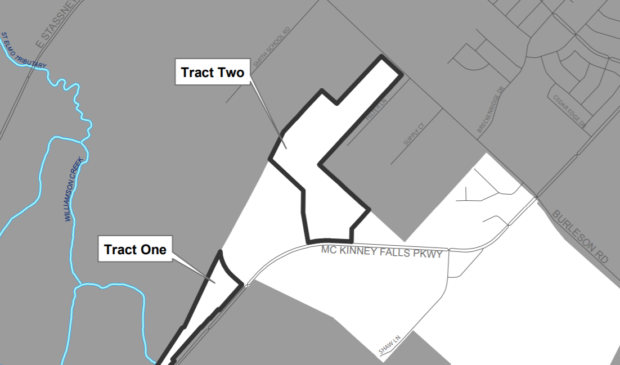Annexation planned for McKinney Falls tract
Friday, April 24, 2020 by
Jo Clifton Sometime in the next few months, the city will likely be annexing a 55-acre tract in Southeast Austin and granting zoning to allow development of the property as a light industrial (LI) site. The matter was on Thursday’s agenda, but was postponed as the result of an agreement between the landowner and city staff, according to Jerry Rusthoven of the Planning and Zoning Department.
In days past, cities were able to annex properties contiguous to existing city land without regard to the property owners’ wishes. However, the Texas Legislature changed all that in 2017 with Senate Bill 6, which states that cities must gain permission from property owners in order to annex their land. That has significantly limited the growth of Austin and other cities. But there are circumstances in which annexation is the best option for the property owner.
Such is the case for Dean Goodnight, who owns two tracts at 5200 McKinney Falls Parkway. In 2009, Goodnight signed a development agreement authorized by Local Government Code Section 43.016, allowing the city to go around his property and annex property on the other side without annexing the Goodnight tract. Rusthoven told the Austin Monitor that Goodnight had an agricultural exemption on the property, so neither the city nor Goodnight would benefit from annexation at that time.
Goodnight is now seeking to sell a 55-acre tract to a developer for an industrial use. However, in order to do that the property owner must be released from his agreement with the city, which would not otherwise end until 2024.
As Rusthoven explained in an April 17 memo to the mayor and City Council, the property owner’s request could be either a one-step or a two-step process. “If Council were to approve the amendment releasing (the 55-acre tract), as requested by the applicant, the amendment simply would release the tract from the agricultural use restriction. Once released, the property could fully develop under extraterritorial jurisdiction rules as provided by Title 30 without annexation.”
On the other hand, Rusthoven explained, if Council declines to approve the amendment releasing the tract, “the owner could return with a request to annex the property to full purpose jurisdiction. The agreement would then be amended at the same time as full purpose annexation,” and the property owner would request the zoning change in order to develop the tract.
Rusthoven said Thursday that the property owner had agreed to withdraw his request to amend the development agreement – which suits the city better – and will allow for the amendment to come forward at the same time as an annexation agreement and zoning request.
Map courtesy of the city of Austin.
The Austin Monitor’s work is made possible by donations from the community. Though our reporting covers donors from time to time, we are careful to keep business and editorial efforts separate while maintaining transparency. A complete list of donors is available here, and our code of ethics is explained here.
You're a community leader
And we’re honored you look to us for serious, in-depth news. You know a strong community needs local and dedicated watchdog reporting. We’re here for you and that won’t change. Now will you take the powerful next step and support our nonprofit news organization?







